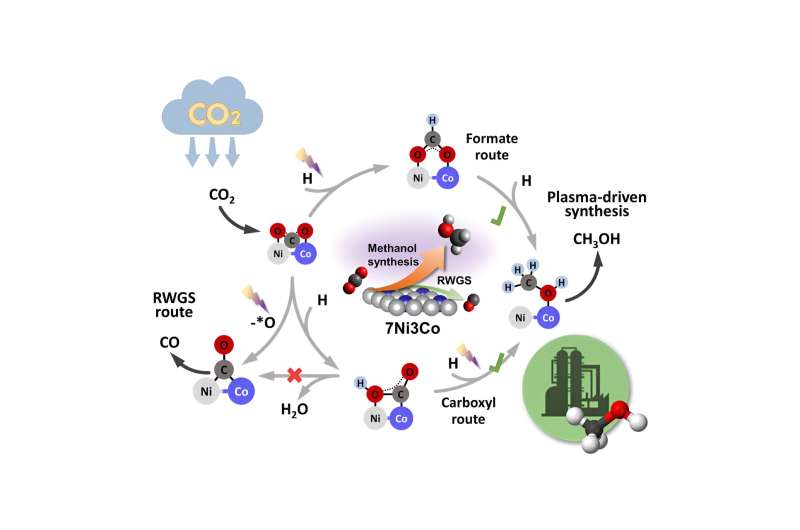This article has been reviewed according to Science X's editorial process and policies. Editors have highlighted the following attributes while ensuring the content's credibility:
fact-checked
peer-reviewed publication
trusted source
proofread
Pioneering plasma-catalytic process for CO₂ hydrogenation to methanol under ambient conditions

Researchers at the University of Liverpool have achieved a significant milestone in the conversion of carbon dioxide (CO2) into valuable fuels and chemicals, marking an important step towards a sustainable net-zero economy.
In a paper published in the journal Chem, the team reports a pioneering plasma-catalytic process for the hydrogenation of CO2 to methanol at room temperature and atmospheric pressure.
This breakthrough addresses the limitations of traditional thermal catalysis, which often requires high temperatures and pressures, resulting in low CO2 conversion and methanol yield.
The novel process utilizes a bimetallic Ni-Co catalyst within a non-thermal plasma reactor to achieve an impressive single-pass 46% selectivity for methanol and 24% CO2 conversion at 35 °C and 0.1 MPa.
Non-thermal plasma, an ionized gas containing energetic electrons and reactive species, can activate strong chemical bonds of inert molecules like CO2, facilitating chemical reactions under mild conditions.
In addition, plasma-based modular systems can be turned on and off instantly, offering great flexibility to use intermittent renewable electricity for decentralized production of fuels and chemicals.
Professor Xin Tu, Chair in Plasma Catalysis at the University of Liverpool, said, "Our work demonstrates that plasma catalysis offers a flexible and decentralized solution for CO2 hydrogenation to methanol under ambient conditions.
"Our recent techno-economic assessment also shows that this process can significantly reduce the capital costs compared with traditional thermal catalytic CO2-to-methanol processes, providing a viable route for utilizing renewable energy sources in the production of synthetic fuels."
In situ plasma-coupled Fourier transform infrared (FTIR) characterization and density functional theory (DFT) calculations revealed that the bimetallic Ni-Co interface is the primary active center for methanol synthesis, with CO2 adsorption and hydrogenation occurring via the Eley-Rideal (E-R) mechanism to produce a variety of intermediates.
Additionally, both the formate and carboxyl routes play a critical role in the formation of methanol, while the reverse water-gas shift (RWGS) and CO hydrogenation pathways were found to be less favorable on the Ni-Co sites.
The precise control of Ni-Co sites in bimetallic catalysts holds significant promise for tailoring the weight of each reaction pathway by promoting asymmetric adsorption of CO2 molecules at the bimetallic interfaces, thereby effectively modulating the distribution of products.
This research underscores the significant potential of plasma catalysis as an emerging electrification technology for sustainable CO2 conversion and fuel production. The ability to perform these reactions at ambient conditions using a modular and scalable plasma system presents an attractive alternative for the chemical industry.
Furthermore, plasma-based systems can be powered by intermittent renewable electricity, enhancing the feasibility of decentralized fuel and chemical production.
This pioneering work is a major step forward in the field of catalytic CO2 conversion and offers promising avenues for future research and industrial applications to meet the challenge of a sustainable future.
The University of Liverpool research team is a leader in plasma catalysis and has also made pioneering advances in plasma catalytic conversion of CO2 to other fuels and chemicals. For example, they have developed promising plasma processes for CO2 methanation and single-step biogas conversion to methanol and have filed three PCT patents in this area.
More information: Yaolin Wang et al, Engineering Ni-Co bimetallic interfaces for ambient plasma-catalytic CO2 hydrogenation to methanol, Chem (2024). DOI: 10.1016/j.chempr.2024.06.022
Journal information: Chem
Provided by University of Liverpool





















